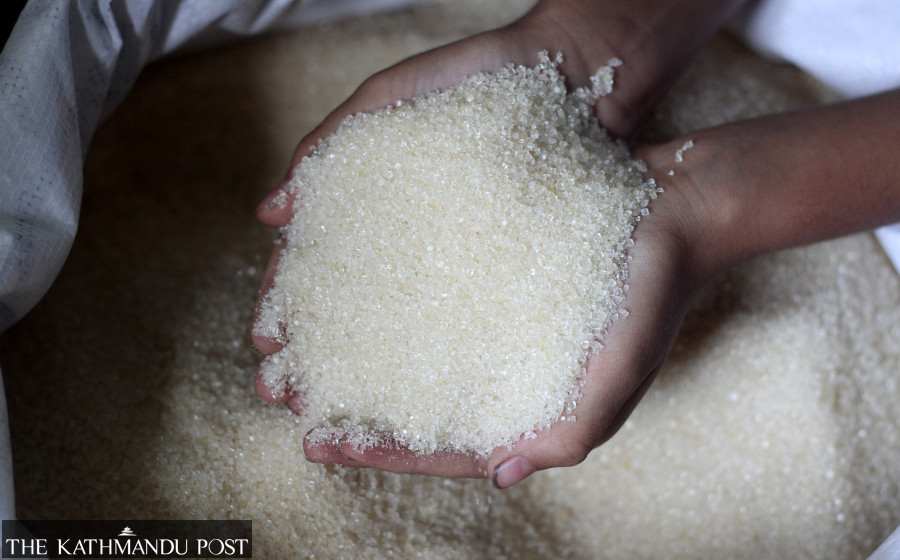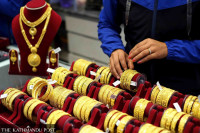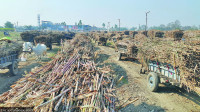Money
Sugar shortage likely due to delayed import process
On September 13, the Finance Ministry approved the import of 20,000 tonnes of sugar for the festive season.
Krishana Prasain
Nepal may potentially face a sugar shortage during the year's main festival season as the two government firms tasked with importing the household sweetener got off to a slow start.
On September 22, Salt Trading Corporation invited international bids for the supply of 10,000 tonnes of white crystal cane sugar. The last date for submitting bids is October 6.
The company currently has 400 tonnes of sugar in its warehouses which will last less than a week.
Officials say that it will take at least two weeks for the sugar to arrive if the entire due process is followed, including shipping time.
This year, Ghatasthapana, the first day of Dashain, falls on October 15.
The other government firm, Food Management and Trading Company, called for bids to supply 10,000 tonnes of sugar on September 27. The last date for the submission of proposals is November 17.
The company has no sugar in its stock.
Officials say that delayed approval by the Finance Ministry has held up the whole import process.
“We received the ministry's go-ahead on September 15,” said Sharmaila Neupane, information officer at Food Management and Trading Company. “It took us a few days to prepare for the global call for tenders.”
It may be difficult for private companies to import sugar this year as, according to Reuters, India is expected to ban mills from exporting sugar beginning in October.
The consumption of sugar both for household and industrial purposes increases ahead of festival time.
India is halting shipments of sugar for the first time in seven years as lack of rain has cut cane yields. India allowed mills to export only 6.1 million tonnes of sugar until September 30, after letting them sell a record 11.1 million tonnes during the last season.
On September 13, the Finance Ministry approved the import of 20,000 tonnes of sugar for the festive season.
The Ministry of Industry, Commerce and Supplies had asked to import 60,000 tonnes of sugar to meet the anticipated festival demand.
“If Indian companies participate in the bidding, there are chances that the sugar will arrive before the festival. But if the bids are won by companies other than India, there are fewer chances that the sugar will be delivered in time for the festival,” said Kumar Rajbhandari, information officer of Salt Trading Corporation.
Officials say that India may fix quotas for the exporters as it is preparing to ban sugar exports.
Rajbhandari said that the import will be assured once the Indian government determines the exporters.
Madhav Timalsina, president of the Consumer Rights Investigation Forum, said due to the negligence of the government, a sugar crisis is imminent during the prime festival season.
“Despite knowing that demand increases sharply ahead of the festival—for both household and industrial purposes—the Ministry of Industry, Commerce and Supplies did not respond in a timely manner,” said Timalsina.
He said that sugar was available in the market but consumers had to pay high prices. “This shows that traders are creating an artificial shortage.”
Sugar was available for Rs88 per kg a few weeks ago, but now it costs Rs140 per kg, he said.
The government levies taxes totalling 43 percent on sugar—30 percent import duty and 13 percent VAT.
But to provide relief to consumers, the government has halved the import duty for the sugar being imported by the two government companies.
“But it appears they won’t be able to import sugar on time and it will be expensive this season,” said Timalsina.
With the festival season approaching, irregularities are appearing in the market .
“During our joint inspection with the District Administrative Office last Thursday, we found a huge quantity of sugar, around 70 tonnes, stored in a warehouse in Kuleshwor,” said Ananda Raj Pokharel, information officer at the Department of Commerce, Supplies and Consumer Protection.
"The sugar bags were found damaged, and there were no labels on some bags," he said.
“We have sent a sample of the sugar for examination after finding that it has not been stored properly. The warehouse has been sealed,” he said.
Pokharel said that they couldn’t say whether the enterprise was hoarding the sugar. “We are studying their invoice.”
The government should have started the process of importing the essential household sweetener through a government-to-government arrangement a month and a half ago, said Timalsina.
"The two government entities need to follow the Public Procurement Act, and following due process means that the sugar will not arrive in time," he said.
Nepal’s annual sugar requirement is around 270,000 tonnes.
The country faces a deficit of about 100,000 tonnes of the sweetener annually which is fulfilled through imports by the private sector and sometimes by the two government companies.
Nepal used to produce 155,000 tonnes of sugar annually till a few years ago, which has now declined to 120,000 tonnes after sugar mill owners failed to pay sugarcane growers on time, according to the corporation.




 8.99°C Kathmandu
8.99°C Kathmandu













